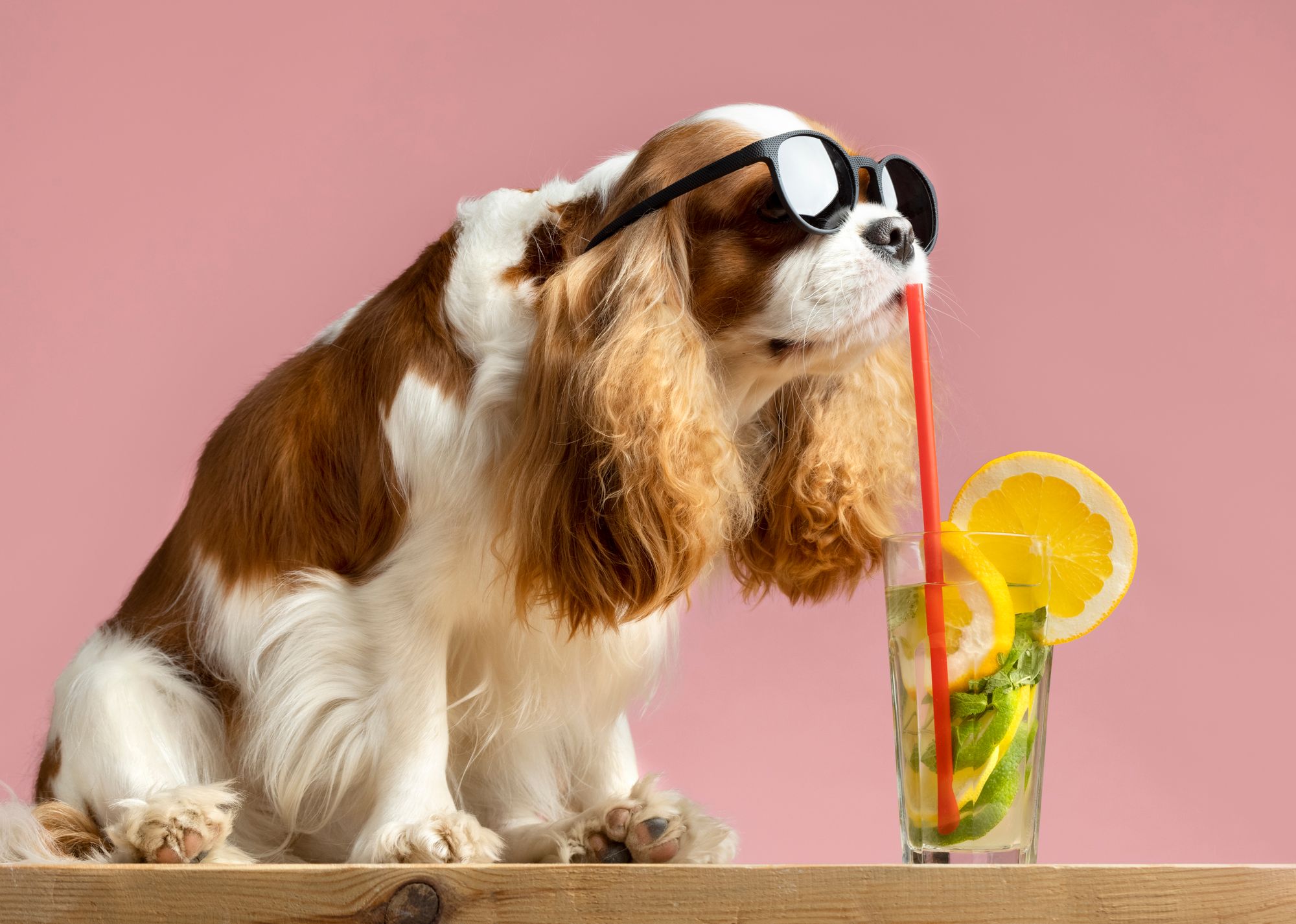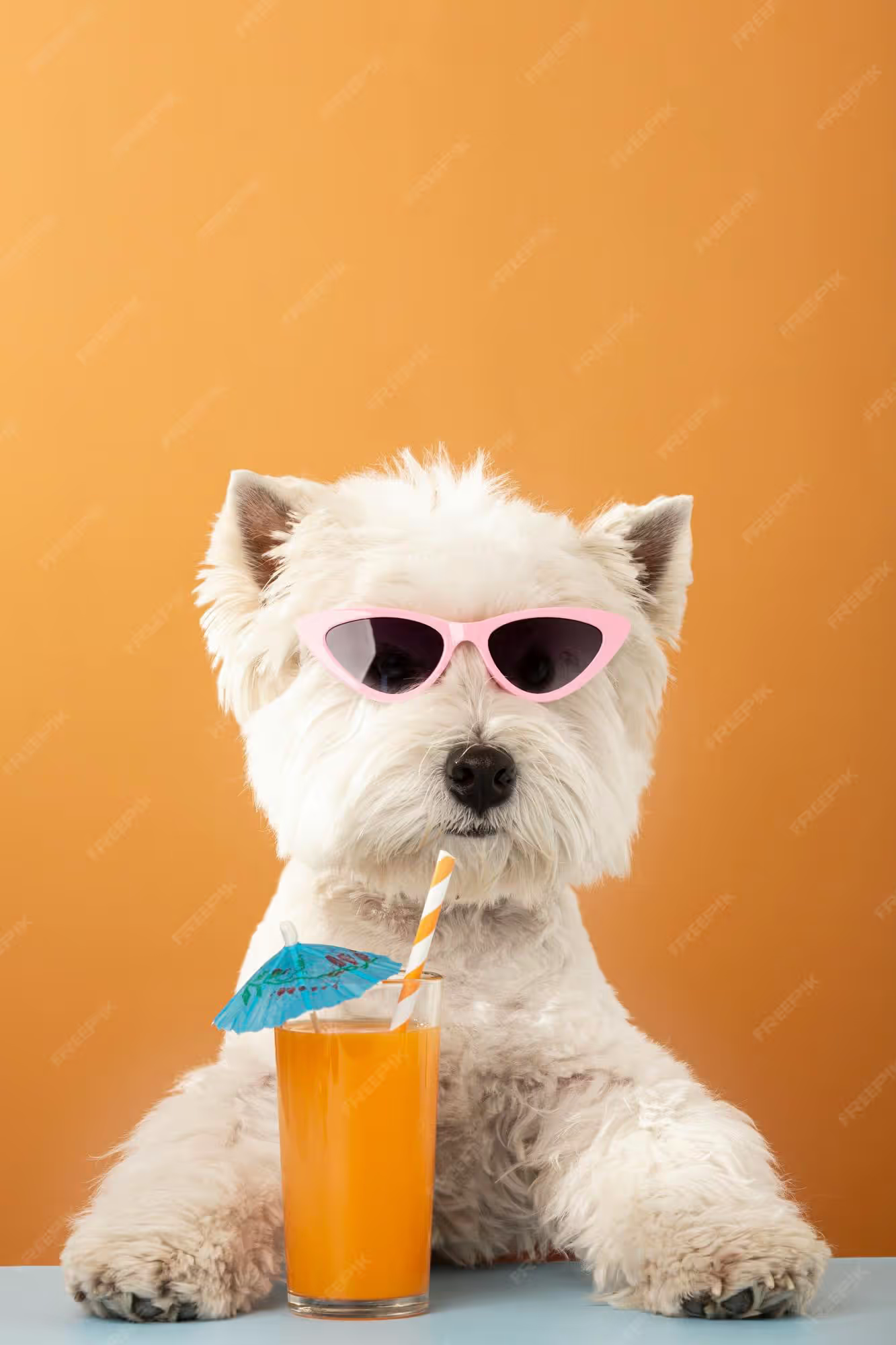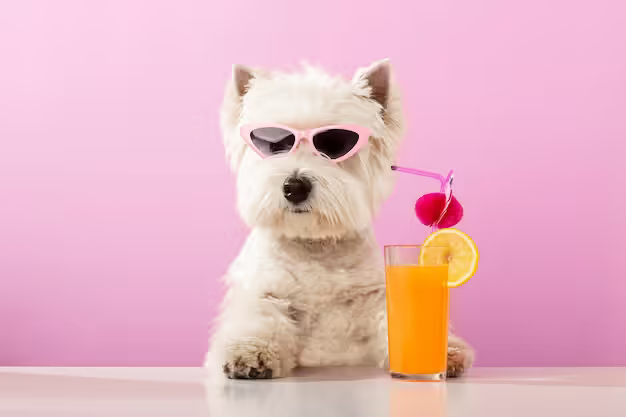Juice has become an integral part of many human diets. From the morning glass of orange juice to that refreshing cranberry cocktail during brunch, these fruity drinks are everywhere. But what about our furry friends? Can dogs partake in our juice-loving culture?
The Quick Answer
The short and simple response? Not all juices are created equal when it comes to our canine companions. While some can be an occasional treat, others should be strictly off-limits.

Safe Juices for Canines
Apple Juice:
Among the safer options for dogs is apple juice. When free from added sugars and preservatives, and given in moderation, it can be a pleasant change from their regular water. However, always ensure it's diluted and not a regular part of their diet.
Blueberry Juice:
Another potential option is blueberry juice. It's packed with antioxidants and can be beneficial in small doses. Just like with apple juice, ensure it's pure and free from any additives.
Juices Dogs Should Avoid
Citrus Juices (e.g., Orange and Grapefruit):
Citrusy juices might be our morning staple, but they can be harmful to dogs. They might cause stomach upset, leading to symptoms like vomiting or diarrhea. Large amounts can even be toxic, so it's best to avoid them entirely.
Grape Juice:
This is one juice dogs must never consume. Grapes and their derivatives have been found to be toxic for dogs, leading to severe health issues like kidney failure. Always keep anything grape-related away from their reach.
Those In-Between Juices
Cranberry Juice:
Cranberries, in their natural form, can be beneficial for dogs in some cases. However, the cranberry juice we often find in stores is usually laden with sugars and other additives. If you're considering giving cranberry juice to your pet, always choose a pure, unsweetened version and consult with a veterinarian first.
Pineapple Juice:
Pineapple in its raw form is generally safe for dogs, but its juice can be a different story. Especially when we talk about commercial pineapple drinks that might contain added sugars and preservatives. If you decide to give pineapple juice, make sure it's in moderation and free from additives.
Better Alternatives for Hydration
When it comes to hydrating our furry friends, the safest and most effective drink is clean water. Always ensure your dog has access to fresh water, especially during hot days.
For those looking to give their pets a treat, consider making DIY dog-friendly popsicles. These can be made by blending dog-safe fruits, pouring the mixture into molds, and freezing them. They can be an excellent way to help your dog cool down in the summer.
Beyond Juice: Other Beverages to Consider
When pondering the broader world of beverages, many dog owners might wonder about other common drinks and their suitability for canines. Let's take a brief dive into some of these.
Milk and Dairy-Based Drinks
Milk might seem like a natural choice since puppies drink their mother's milk. However, as dogs age, many of them develop lactose intolerance. This means that consuming dairy can lead to upset stomachs, gas, and diarrhea. If considering giving milk, always start with small quantities and monitor for any adverse reactions. Similarly, dairy-based drinks like lattes or flavored milk should be approached with caution, especially due to added sugars and flavorings.
Coconut Water
Coconut water is hydrating and packed with electrolytes. While it's not harmful to dogs, its high potassium content might not be ideal for regular consumption. As with many other beverages, moderation is the key, and always ensure that the coconut water doesn't contain any added sugars or flavorings.
Herbal Teas
Certain herbal teas can be beneficial for dogs. For instance, chamomile tea can help calm an anxious dog, while peppermint tea might assist with digestion. However, always ensure the tea is caffeine-free and lacks any added sweeteners. Also, always consult with a veterinarian before introducing herbal remedies to your pet's diet.
The Golden Rule: When in Doubt, Check
The world of human beverages is vast, and not everything we consume is suitable for our canine companions. As responsible pet owners, our primary concern should always be the health and well-being of our furry friends.
Any new addition to a dog's diet, whether it's a type of juice or another beverage, should be introduced gradually and under close observation. Note any changes in behavior, digestion, or overall health. Remember, while experimenting can sometimes lead to finding a new treat your dog loves, their long-term health is paramount.
Lastly, always have a trusted veterinarian on speed dial. They can provide guidance tailored to your dog's specific needs and conditions. While articles and general advice can be helpful, personalized counsel from a veterinary professional remains unbeatable.
In sum, while juices and other beverages might occasionally find a place in a dog's diet, nothing beats the simplicity and safety of fresh water. Keep those bowls filled, and keep those tails wagging!
Water Additives and Supplements
With the growing pet care market, there are now a plethora of water additives and supplements specifically designed for dogs. These range from dental care solutions to vitamin-packed infusions.
Dental Water Additives
Oral health is paramount for dogs. Dental water additives are products you can add to your dog's water bowl to help reduce plaque and tartar buildup. They often contain enzymes that break down harmful bacteria in the mouth, promoting fresher breath and healthier gums. If you're finding it challenging to brush your dog's teeth regularly, this might be a handy supplement to consider. Always opt for veterinarian-recommended brands.

Vitamin and Mineral Infusions
Just as we have vitamin-infused waters, there are now similar products for dogs. These infusions can provide a boost of essential vitamins and minerals. However, it's essential to understand that while these products can offer supplementary benefits, they should not replace a balanced diet or prescribed supplements. Overconsumption of certain vitamins can be harmful, so always consult with your veterinarian before introducing these to your dog's routine.
Flavor Enhancers
Some dogs can be finicky drinkers, especially when they're new to a home or recovering from an illness. Flavor enhancers, often made with broth or meat flavors, can encourage them to drink more. These can be especially useful during hot weather or post-exercise when hydration is crucial. Always choose products without added salt, artificial flavors, or harmful preservatives.
The Power of Simple Hydration
While the market offers a myriad of options to spice up your dog's drinking routine, it's crucial to remember the unparalleled importance of plain, clean water. Every cell, tissue, and organ in your dog's body needs water to function correctly. Dehydration can lead to severe health issues, from kidney problems to overheating.
Monitoring Water Intake
Regularly monitor how much water your dog consumes. Factors like their size, diet, activity level, and the weather can influence their hydration needs. A sudden increase or decrease in water consumption can be indicative of underlying health issues.
Water Quality Matters
Beyond just the type of beverage, the quality of the water we provide to our pets is of paramount importance.
Tap Water vs. Filtered Water
Many of us give our dogs water straight from the tap without a second thought. But, depending on where you live, tap water can contain various contaminants, including heavy metals, chlorine, and fluoride. While these elements might be in amounts safe for human consumption, the long-term effects on dogs, who might have a different tolerance level, are less clear.
Filtered water can remove many of these potential contaminants, ensuring a cleaner drink for your canine companion. If you've ever noticed your dog lapping up rainwater with more gusto than they show for tap water, it might be because rainwater lacks these additives.
Hard Water and Its Effects
Hard water, which is high in minerals like calcium and magnesium, is safe for dogs to drink. However, if your dog drinks hard water exclusively, it might lead to mineral buildup in their body. Over time, this can contribute to urinary issues, such as bladder stones.
Bottled Water: Is It Worth It?
Some dog owners, particularly those who travel with their pets, often use bottled water. It’s a convenient choice, but it's essential to ensure the bottled water doesn't have too many added minerals or is excessively purified (like distilled water), as it might lack the essential minerals that dogs need.
Refresh Regularly
Stagnant water can become a breeding ground for bacteria. It's essential to refresh your dog's water bowl at least once a day, even if it's not empty. Also, washing the bowl daily can prevent slime buildup, ensuring your dog gets a clean drink every time.

Hydration Beyond Drinking
Remember, hydration for dogs doesn't just come from what they drink. The food they eat, especially wet dog food, can provide a significant amount of their daily water intake. If you feed your dog a dry kibble diet, they might require more water than a dog on a wet food diet.
The Importance of Proper Bowls and Containers
As we dive deeper into the well-being of our canine companions, the containers from which they drink also play a pivotal role.
Material Matters
Plastic Bowls: While plastic bowls are inexpensive and lightweight, they can pose several problems. Some dogs can develop allergies to certain types of plastics, leading to a condition called plastic dish dermatitis, characterized by a loss of pigmentation on the nose. Additionally, plastic bowls can get scratches over time, which can harbor bacteria and be challenging to clean thoroughly.
Stainless Steel Bowls: These are a more hygienic option. They're rust-resistant, durable, and don't hold odors. They're also unlikely to cause any allergic reactions.
Ceramic Bowls: Ceramics are heavy, ensuring that your dog won't easily tip them over. However, ensure they are lead-free and regularly check for cracks, as these can be breeding grounds for bacteria.
Proper Cleaning is Essential
No matter the material, regularly cleaning your dog's bowls is vital. Leftover food particles, saliva, and standing water can become breeding sites for harmful bacteria. Ideally, bowls should be cleaned daily and thoroughly dried before refilling.
Automated Water Dispensers
For those with busy lifestyles, automated water dispensers can be a blessing. They ensure a constant supply of fresh water for your dog. Some even come with filters, ensuring the water is clean and free of common contaminants. However, even with these devices, regular cleaning and maintenance are crucial.
Location, Location, Location
Where you place your dog's water bowl can also impact their drinking habits. Ensure it's in a quiet, easily accessible place where they can drink without disturbances. During hot months, consider placing multiple water bowls around your home, especially if you have a larger house or outdoor space.
Observing Drinking Habits
Regular observation of where, when, and how much your dog drinks can offer insights into their health. If you notice a sudden increase or decrease in their water intake or any signs of discomfort while drinking, it might be time for a vet visit.
The Holistic Approach to Canine Care
Caring for our canine companions extends far beyond just feeding them. Every detail, from the water's quality to the bowls they drink from, has a part to play in their overall health. By taking a holistic approach, considering all aspects of their care and environment, we can ensure they live their happiest and healthiest lives by our side.
Dogs give us their unconditional love, loyalty, and companionship. In return, our responsibility is to provide them with a safe, nurturing environment, and that starts with something as fundamental as their daily water intake.
The Behavior Surrounding Hydration
Beyond the technicalities of what and how they drink, understanding the behaviors our dogs exhibit around their water bowls provides another layer of insight.
Lapping It Up: The Science of Dog Drinking
Ever wonder why your dog makes such a mess when they drink? The way dogs drink is a unique adaptation. Unlike humans who can suck liquids into our mouths, dogs have to lap up their drinks with their tongues. They curl the tip of their tongue backward to create a sort of mini cup, then swiftly bring the water into their mouths. This process is efficient, but can sometimes result in water being splashed around, especially if they're particularly thirsty or drinking in a hurry.
The Hesitant Drinker
Some dogs might be wary or hesitant around their water bowls. This behavior can be due to a few reasons:
- Past Traumas: Dogs that have been previously denied water or have had negative experiences around their bowls might approach drinking with caution.
- Bowl Placement: If the bowl is placed in a high-traffic area or somewhere with startling noises, the dog might be uncomfortable or scared to drink.
- Health Issues: Dental problems or other medical conditions can make drinking painful or uncomfortable.
If your dog is hesitant to drink or seems to be drinking less than usual, it's crucial to address the issue promptly, whether by changing the bowl's location, consulting with a vet, or seeking behavioral training.
Overhydration: A Rare but Real Concern
While underhydration or dehydration is a well-understood concern for pet owners, overhydration or water intoxication can also pose a significant threat. It happens when a dog consumes an excessive amount of water in a short time, diluting the body's electrolytes and affecting brain function. Symptoms include lethargy, bloating, vomiting, glazed eyes, and in severe cases, unconsciousness.
This condition is rare but can be seen in dogs that love playing with sprinklers, hoses, or fetching toys from water bodies for extended periods. Always monitor playtimes around water and ensure breaks for your pup.
Hydration and Diet
The type of food your dog eats can significantly influence their water needs. Dogs on a predominantly dry kibble diet will naturally need more water compared to those on a wet food or raw diet, which inherently contains more moisture. Understanding this balance is essential, especially when transitioning between different food types.
The Future of Canine Care and Hydration Monitoring
While we've been discussing the intricacies of canine hydration, it's essential to highlight that modern technology is stepping up to make pet care more efficient than ever. Enter the Fi dog collar, a cutting-edge device that offers a multitude of features to ensure your furry friend's well-being.
A Closer Look at the Fi Dog Collar
Beyond its tech components, the Fi collar is made with materials that prioritize both durability and your dog's comfort. Unlike plastic that might cause allergies, Fi uses materials that are hypoallergenic and built to last, ensuring your dog stays comfortable and safe.
Automated Hydration Monitoring
One of the standout features of the Fi dog collar is its ability to monitor your dog's activity levels. While it doesn't measure water intake directly, by understanding how active your dog is, it gives you a ballpark figure of how much water they might need. For instance, after an intense play session tracked by the collar, you'd be alerted to provide more water for rehydration.
Location & Drinking Habits
With Fi's location tracking, you can pinpoint where your dog likes to drink, especially if you have multiple water stations or if your dog has access to outdoor water sources. This feature ensures they aren't consuming potentially unsafe water.
Monitoring Behavior with Fi
The Fi collar offers real-time activity tracking, helping you understand your dog's behavior better. If they're suddenly more lethargic and drinking less, or perhaps showing signs of overhydration after a day playing by the lake, the collar's tracking data can provide valuable insights.
Conclusion:
Ensuring proper canine hydration involves understanding the nuances of what they drink and recognizing their unique behaviors and needs. From determining the safety of various juices to ensuring the cleanliness and quality of their water sources, every detail matters. Bowl materials, water quality, and keen observation of drinking habits play essential roles in their overall well-being. By combining age-old wisdom with new insights, we can create an environment where our furry companions remain well-hydrated, healthy, and vibrant. In essence, prioritizing hydration is a testament to the deep bond we share with our four-legged friends.




